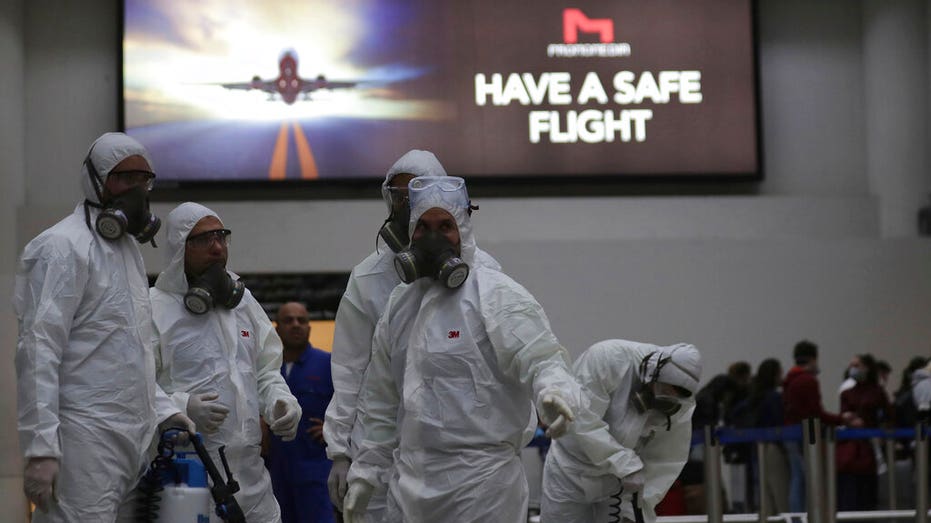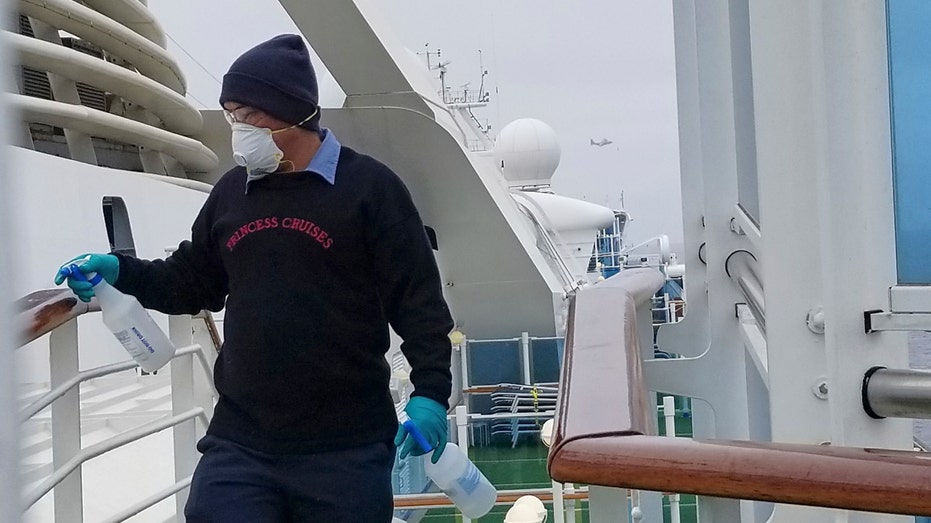Coronavirus fears may not be enough for travel insurance payouts
Airline industry could face $113 billion in losses, but will insurers cover it all?
Travelers who are worried about the coronavirus outbreak and want to cancel their trips likely won’t be able to turn to their travel insurance providers for reimbursement.
Several major travel insurers’ policies reviewed by FOX Business show they wouldn’t consider travelers’ fears as a reason to cancel a trip and file a claim because the outbreak has been a widely known risk for more than a month.

Workers wearing protective gear spray disinfectant as a precaution against the coronavirus outbreak, in the departure terminal at the Rafik Hariri International Airport, in Beirut, Lebanon, Thursday, March 5, 2020. (AP Photo/Hassan Ammar)
CORONAVIRUS MEANS THESE AIRLINES WAIVING CANCELLATION, CHANGE FEES
Allianz Travel Insurance said trip cancellations related to epidemics are generally not covered, but it will provide coverage for emergency medical care and emergency medical transportation claims related to the coronavirus. However, Allianz said it is temporarily offering refunds for the cost of its travel protection plans to customers whose trips were canceled by travel suppliers or if the trip was booked to China.
Generali Global Assistance noted that “fear of travel” is not covered by most of its plans. The company said the outbreak “is considered a foreseeable event” for any plans bought on or after Jan. 29. But customers who are diagnosed with the coronavirus or quarantined can be covered.
Similarly, Seven Corners officials said fear of contracting coronavirus isn’t an “applicable trigger” for trip cancellation coverage, but company officials said that travelers with its “cancel for any reason” plans could apply if they meet the requirements. A cruise or tour departure delayed by a quarantine could also be covered.
AIG's Travel Guard also said fear of travel is generally not covered, and that it considers the outbreak a “known risk” as of Jan. 24. But travelers who contract coronavirus while on a trip or are quarantined could qualify for coverage.
Travel Insured International said its customers who become ill with coronavirus while traveling could also be eligible for coverage.
| Ticker | Security | Last | Change | Change % |
|---|---|---|---|---|
| ALIZY | ALLIANZ SE | 43.97 | +0.05 | +0.12% |
| ARZGY | ASSICURAZIONI GENERALI SPA | 20.9 | -0.13 | -0.63% |
| AIG | AMERICAN INTERNATIONAL GROUP INC. | 79.53 | -0.22 | -0.28% |
GET FOX BUSINESS ON THE GO BY CLICKING HERE
Usually, travelers have been able to get refunds if a travel advisory was issued after they booked. Since the outbreak, the U.S. State Department has issued 13 Level 2 advisories which recommend "Exercise Increased Caution." It has also issued seven Level 3 advisories which strongly suggest fliers to "Reconsider Travel."
Already two Canadian travel insurance providers — Manulife and TuGo — have said they will no longer offer coverage for refunds if a travel advisory was issued after they booked.
The International Air Transport Association (IATA) issued a new report Thursday that said "global revenue losses for the passenger business of between $63 billion (in a scenario where COVID-19 is contained in current markets with over 100 cases as of 2 March) and $113 billion (in a scenario with a broader spreading of COVID-19)" is now anticipated. With the bulk of those losses in ticket sales/trip cancelations, air travel insurance companies could be facing their own financial challenges in paying out on tens of thousands of policies. Stocks for AIG, Allianz and Generali all closed down on Friday.
Some good news for travelers is that, even if their travel insurance may not pay off, many airlines and cruise lines are offering penalty-free opportunities to re-book plans for a later date. On Friday, Princess Cruises and Disney Cruise Lines both offered full credit on canceled trips to be applied to future trips.
Numerous airlines have made similar offers, with some limiting them to flights to or from areas heavily affected by the outbreak.

In this photo provided by Michele Smith, a cruise ship worker cleans a railing on the Grand Princess Thursday, March 5, 2020, off the California coast. (Michele Smith via AP)
PRINCESS EASES CANCELLATION POLICY AFTER VIRUS HITS SECOND SHIP
China still makes up the bulk of the confirmed coronavirus cases, with more than 80,000 out of about 100,000 worldwide, according to the World Health Organization. South Korea, Iran and Italy each also have several thousand cases.
In the United States, there were more than confirmed cases, according to the Centers for Disease Control and Prevention.




















